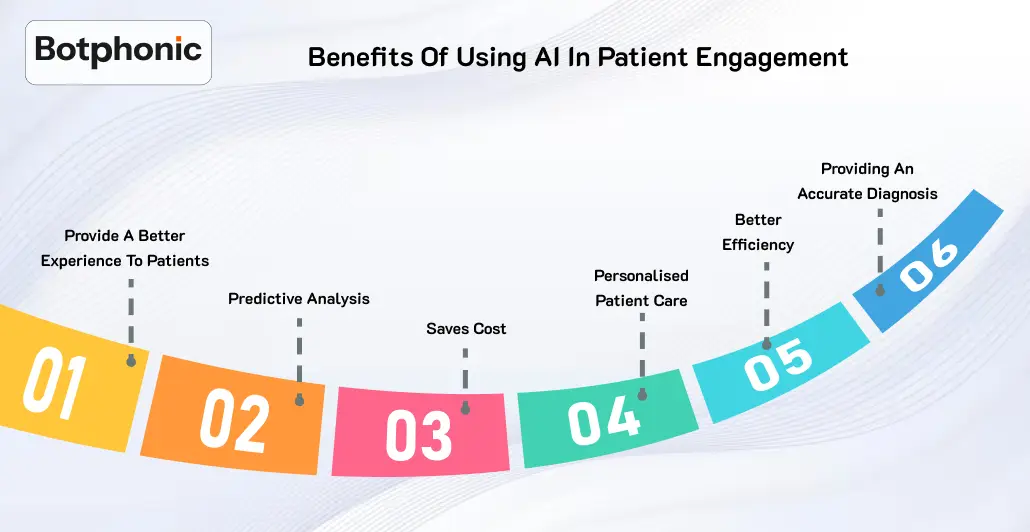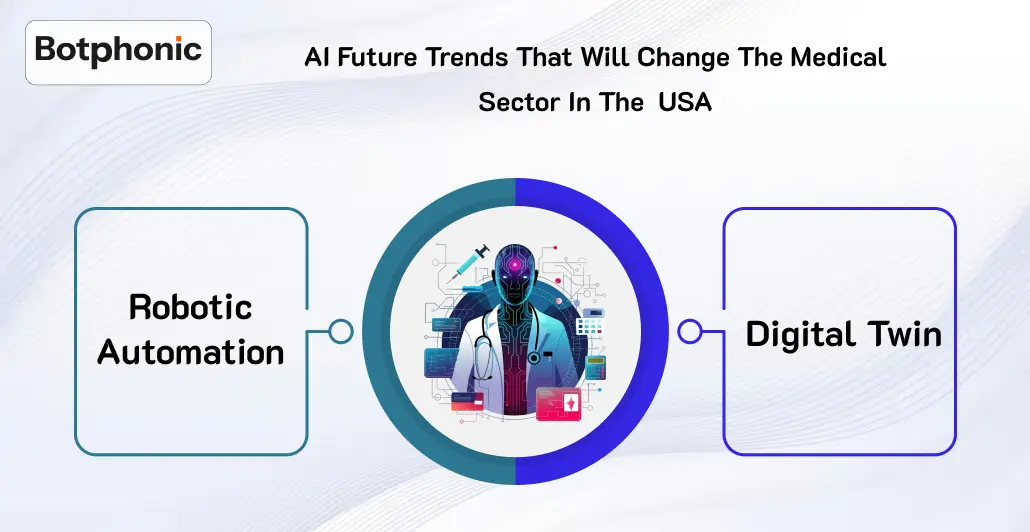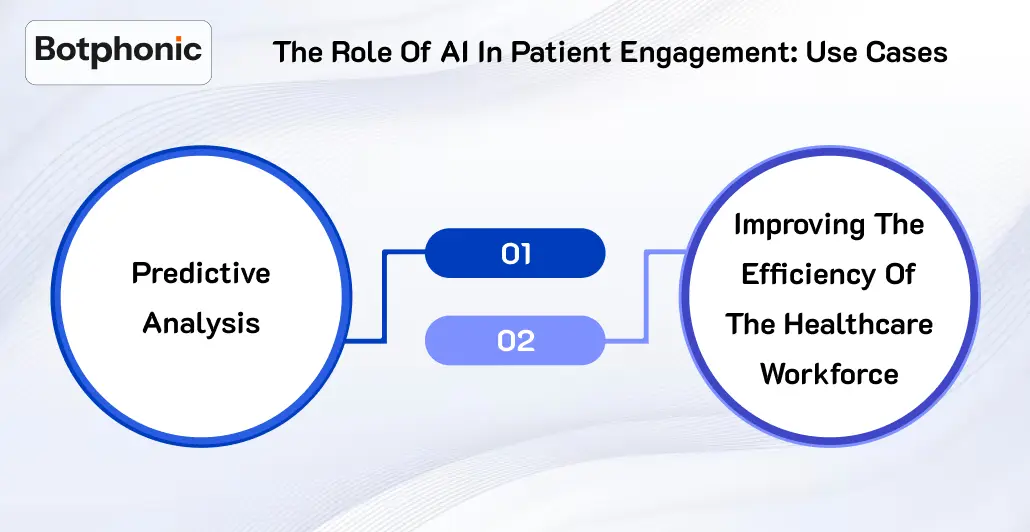
Summarize Content With:
Summary
The role of AI in patient engagement is impeccable; it provides fast, smart, and personalised solutions to patients. Real-time chats and predictive tools resolve all the challenges, such as delay, confusion, and missed follow-ups, of the healthcare sector. In this blog, I will explore the role of AI in patient engagement and how it eases the manual workload of doctors and the administrative department. Also, we will explore its key benefits, use cases, and future trends to help you get a more comprehensive view of AI platforms. Keep reading!!!
Introduction
Why is the Healthcare experience frustrating? Missed follow-ups, long waits, and confusing medical jargon all make patients disengage.
When you’re sick, you need strong, fast, simple, and personalised support. However, traditional healthcare is often slow and inefficient, leading to patient frustration. In the modern world, patients are expecting easy access, fast response, and smart solutions.
Thanks to artificial intelligence!!. The role of AI in patient engagement is high-impactful and fills the gap, turning healthcare from slow & stressful to smart & efficient.
AI chatbots give an instant reply to patients’ questions, and predictive tools help to analyze the patients’ symptoms at an early stage. The AI voice assistant is transforming the ways patients interact with healthcare professionals.
Benefits of Using AI in Patient Engagement

I hope you got a brief overview of the role of AI in patient engagement. Next, we will explore some benefits of AI in patient engagement.
1. Provide a better experience to patients
AI chatbots and AI virtual assistants are active around the clock, and patients can book an appointment even at midnight. Further, AI voice agents can provide resolutions to faq, understand the medical process, and provide personalized support to patients, without human intervention.
2. Predictive analysis
AI can easily predict medical symptoms of patients and the time for thier recovery. Further, AI helps to understand the health symptoms more accurately and how to initiate treatment before it gets worse. Doctors get early warning of patient health symptoms, increasing the possibility of timely treatment.
3. Saves cost
AI in healthcare automates the entire admin work, doctor manual workloads, and diagnoses, thus reducing the overall cost. Healthcare becomes affordable and scalable, especially in rural and remote areas.
4. Personalised patient care
Doctors cannot give enough time to each patient because every patient requires different treatment, making it impossible to pay enough attention to each patient’s health conditions. Timely treatment is a crucial factor for every hospital, but most fail to achieve it. Thanks to artificial intelligence!!! AI can analyze the patient’s genes, lifestyle, and medical history and prepare a customized treatment plan for patients. Thus, deploying an AI call assistant in healthcare helps doctor provides better care to patients.
5. Better efficiency
AI can handle all the manual, boring tasks of the admin department, such as booking appointments, checking bills, and checking report status. Thus, doctors can give proper care to patients and save time on manual repetitive tasks.
6. Providing an accurate diagnosis.
AI can scan and analyze the patient’s data and predict life-threatening diseases like heart problems, neurological problems, and cancer at the early stages. Thus, a doctor can initiate treatment at the early stages and save the patient’s life.
AI Future trends That Will Change the Medical sector in the USA

Here, I curated a list of a few trends of AI platforms.
1. Robotic automation
Nowadays, surgeries are not just limited to doctors. With the help of advanced AI robotics, the operations process becomes more precise and safe. Additionally, an automated pharmacy system reduces the workload and chances of error, and patients will get medication on time without delay.
The main goals of AI future trends are to achieve better outcomes, faster recovery, and smarter healthcare solutions. With AI, the healthcare future will become more advanced and ultra-personalised with a human touch.
2. Digital twin
Digital twin means your virtual health copy. Further, it is a model that captures real-time body data such as heart rate, sugar level, etc, from IoT devices and prepares a live simulation of patient health. Doctors can utilise this data for predictive interventions. Doctors can provide solutions before the symptoms occur. Further, treatment can be adjusted in real time, and AI call assistant can suggest customized treatment plans for patients.
The Role of AI in Patient Engagement: Use Cases

I hope you got a clear understanding of the benefits of the role of AI in patient engagement. Next, we will sell some use cases.
1. Predictive analysis
Imagine doctors can predict a life-threatening disease before it occurs? Sounds amazing, right?
AI-powered predictive analysis helps doctors to predict the symptoms before they occur. AI platforms analyze the patient data deeply, such as medical records, test reports, and social factors, and predict the type of disease that is likely to occur in the future. The patient doesn’t need to wait for the medical condition to get worse; doctors can start treatment right away.
1.1 Identifying high-risk diseases at an early stage.
AI in medical care not only analyzes patients’ data but also makes connections between past illnesses, current results, and test results, and creates a strong risk profile for every patient. With the help of these profiles, doctors can predict chronic diseases like diabetes, cancer, and heart problems before the symptoms get worse.
How does AI identify high-risk patients?
- AI can detect subtle changes in vital signs that are likely to create risks in the future.
- AI can predict life-threatening diseases such as diabetes, liver disease, cholesterol, brain strokes, heart diseases, and more at the early stages.
- AI can scan the manual notes of doctors and give them early warning signs of health symptoms.
1.2 Proactive Intervention
After determining the high-risk patients, it’s now time to take action, and that’s where AI truly shines. These smart solutions prepare personalized treatment plans based on patients’ habits, appointments, and medications. It tracks all the relevant details and sends timely alerts and reminders. Further, AI platforms provide suggestions to patients, such as lifestyle changes, digital check-ins, and urgent care visits in real time by reading the patient’s data.
Results?
- Timely treatment of health symptoms before they get worse.
- Better long-term outcomes.
- Reduces the load on doctors and the admin department.
- All patients receive care and attention, and no one is missed.
Pro tips: Integrate predictive analytics tools into your Electronic Health Record (EHR) system so that real-time alerts and risk scores can be accessed whenever providers need them, enabling timely intervention to be easier and more effective.
2. Improving the efficiency of the healthcare workforce
Nowadays, AI platform not only eases diagnosis but also make the entire staffing and operation smart, fast, and efficient. With AI-powered analytics, doctors can predict where there will be a surge in patient visits, which shifts may require additional staff, and which department will have higher demands. Result? More efficiency, less waiting time, and better patient service.
2.1 Proper Resource Allocation
Many healthcare sectors face struggles such as staff shortage, overcrowding, and resource management. Further, AI can easily resolve these issues by analyzing real-time data such as patient inflow, peak hours, and appointment trends. By analyzing these data, hospitals get a clear picture of allocating resources and how to manage them properly.
How does AI optimise the healthcare workflows?
- If demand rises, AI platforms adjust accordingly and provide instant responses.
AI smartly distributes the resources and maintains workload balances.
- By using a predictive algorithm, hospitals can predict delays and bottlenecks that affect the process.
- AI efficiently schedules staffing and reduces burnout.
Let your small businesses use Botphonic AI for automation.
Try Botphonic for free now.Conclusion
AI technology has become a game-changer for the medical sector. AI in healthcare not only improves doctors’ efficiency but also takes patient communication and care experience to the next level. From automated follow-ups to no-show prediction, the entire medical process becomes smarter and faster. Clinical practices and trials are adopting AI platforms to get high-impact results. Ready to take the next step? Connect with Botphonic and book a free demo session!!!

